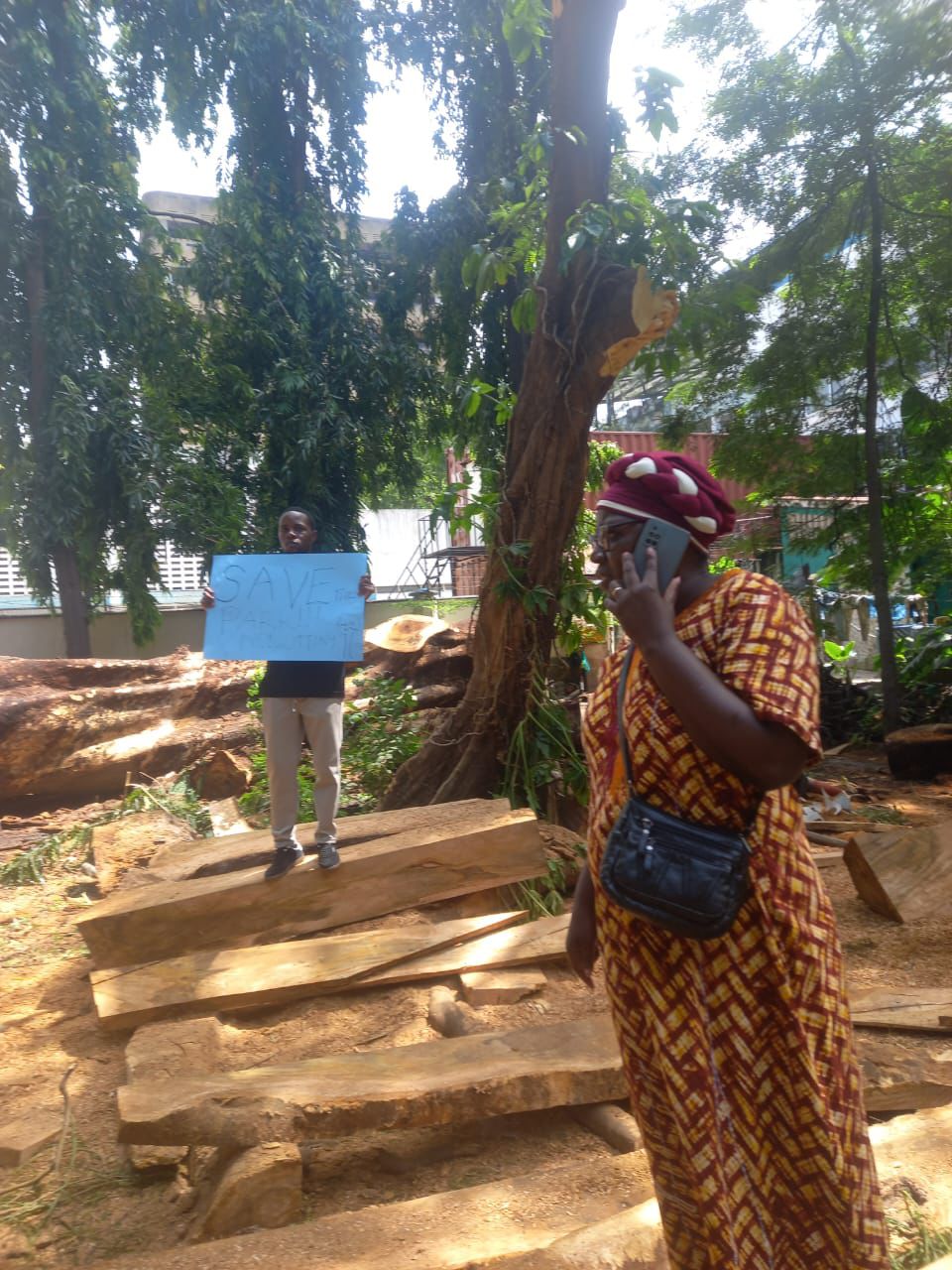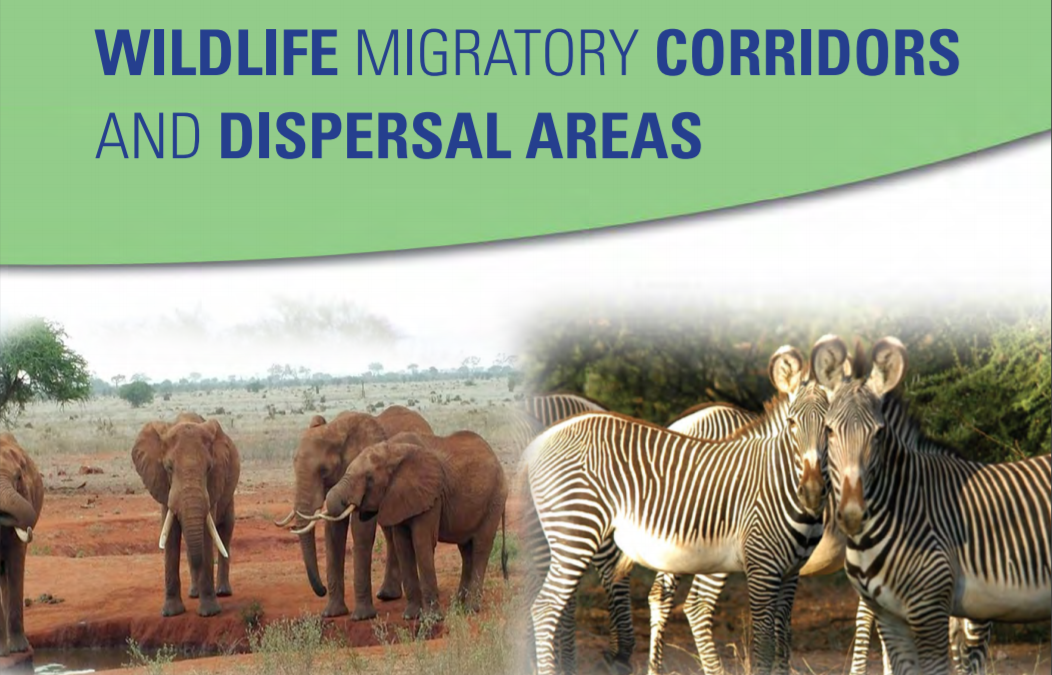-
+ 254 (0) 20 2000290
+254 716 842 277
-
Africa Conservation Centre
Hekima Road, Karen, Nairobi
-
Mon - Fri 8:00am - 5:00pm
- Details
- Written by Steve Itela
- Category: Press_releases
- Hits: 661
PRESS RELEASE FOR IMMEDIATE RELEASE
Nairobi, Kenya, 31 May 2025
Kenyans Occupy Mombasa’s Uhuru Gardens to Halt Illegal Tree Cutting. Conservation Alliance of Kenya Demands Accountability and Restoration
In a remarkable show of love for the environment, Kenyans united on Friday, June 30, 2025, to halt illegal tree cutting at the historic Uhuru Gardens in Mombasa, following the sound of chainsaws in the area. Concerned residents, including children and the elderly, swiftly intervened, gaining online support to halt the destruction and save many trees. However, two significant trees were already cut down before officials from the government authorities arrived in response to the public outcry. Thanks to the community's quick actions, further damage was prevented.
"This isn't just about trees; it's about protecting our national heritage and safeguarding Kenyans' right to a healthy environment," said Steve Itela, CEO of the Conservation Alliance of Kenya (CAK). "Uhuru Gardens belongs to all Kenyans, and we won't allow illegal actions for profit."
The illegal tree cutting broke several national laws aimed at protecting the environment and heritage, including:
- Cutting trees without proper permission or Environmental evaluation;
- Removing indigenous trees from public land without authorization;
- Disturbing a protected colony of bats that contribute to our biodiversity;
- Violating the protected status of Uhuru Gardens as a national monument.
- Failing to inform the public or include them in decision-making processes;
- Ignoring necessary approvals for land use and actions that affect public resources; and
- Threatening Kenyans' right to a healthy environment.
Despite the clear legal violations, no one has been arrested. There are disturbing reports that county officials took the timber from the chopped trees, sparking concerns about motives driven by profit. Mombasa County's explanations for the actions, ranging from bird droppings to root damage, have been dismissed by experts as false. No public notices or assessments were made before the trees were cut down.
Public scepticism has grown around the Governor’s claims of not being aware of the operation, especially since it was reported to have occurred during Friday prayers to avoid scrutiny. Even though the Governor has condemned the tree cutting, no disciplinary actions have been taken. CAK is calling on the Governor, the County Executive Committee, and various national bodies to take immediate action to address these issues.
The Conservation Alliance of Kenya, along with other civil society organizations, is preparing to take legal action against Mombasa County. They are demanding:
- Immediate Stop to All Tree Felling at Uhuru Gardens; No further trees should be removed until a complete environmental assessment is done and approved by relevant authorities.
- Urgent Independent Ecological Survey; an expert team should evaluate the condition of the remaining trees and the protected bat colony, and assess the overall importance of the site for biodiversity and heritage.
- Transparent, Science-Based Risk Management Plan; If risks are identified, a non-destructive management plan should be developed in collaboration with the public and expert guidance, ensuring the safety and preservation of the area.
- Inclusive Stakeholder Engagement; local residents, ecologists, park users, and conservation groups should be actively engaged in creating a long-term management plan for Uhuru Gardens that ensures public safety, environmental protection, and heritage preservation.
Uhuru Gardens is not just a park; it serves as a vital green space and sanctuary for wildlife in one of Kenya's busiest cities. Itela said, "This incident is part of a worrying trend, as urban green spaces across Kenya face increasing threats from inappropriate development and illegal exploitation."
We commend the brave citizens and the swift response by government authorities who acted quickly to defend their environment. Together, we can ensure these public green spaces are protected for generations to come.
ABOUT THE CONSERVATION ALLIANCE OF KENYA (CAK)
CAK serves as the national umbrella body for conservation organizations in Kenya. Its mandate encompasses protecting biodiversity, promoting sustainable land use, and advocating for environmental justice. Uhuru Gardens is not only a heritage site but also a vital urban green space, and its unlawful destruction threatens both biodiversity and public environmental rights.
For media inquiries, please get in touch with Mary:
Email: This email address is being protected from spambots. You need JavaScript enabled to view it.
Phone: 254 716 842 277
Facebook | Twitter | Instagram| LinkedIn|
- Details
- Category: Press_releases
- Hits: 1817
Press Release
(Nairobi, Kenya – December 8, 2022) – Kenya’s Government today in consultation with Conservation Alliance of Kenya and International Fund for Animal Welfare (IFAW) held the first-ever meeting of the “Wildlife Conservation Roundtable”, a unique initiative to discuss the critical role of wildlife in solving biodiversity challenges, specifically climate change.
The meeting hosted by the Ministry of Tourism and Wildlife in Nairobi brought together representatives from non-governmental organizations, public, commercial sector, and government.
“Our fervent wish is a unified sector where people, environment and economy, are thriving and benefiting sustainably from Kenya’s real wealth which lies in the resources of the earth—soil, water, forests, minerals and wildlife,” said Hon. Peninah Malonza, Cabinet Secretary, State Department of Tourism and Wildlife.
Azzedine Downes President and CEO International Fund for Animal Welfare (IFAW) said, “The objective of the Wildlife Round Table is to foster synergy between diverse sectors to support wildlife conservation.”
“We have drawn together decision makers who may not have previously considered the critical role they can play in Kenya’s development agenda while still supporting its biodiversity goals and helping limit climate change,” added Downes.
Earlier this week, a meeting IFAW and H.E. President William Ruto agreed that Kenya will be key to the success of Room to Roam—a long-term plan that works across agencies to protect critical landscapes from Southern to East Africa.
Lucy Waruingi, Conservation Alliance of Kenya Board Chair said, “Today marks an important development for the wildlife and conservation sector. The roundtables will enable the conservation sector to engage on a high-level platform on the cross-cutting issues that affect sustainable management and use of our natural resources.
“This will create the space needed to ensure conservation is everyone's business and we welcome the leadership of the Ministry of Tourism and Wildlife and H.E President Dr. William Ruto in launching this initiative.”
Ends
Press Contact:
Jacqueline Nyagah
M: 254 722 607640
E: This email address is being protected from spambots. You need JavaScript enabled to view it.
Shillah Raymond
M: 254 724 283796
E: This email address is being protected from spambots. You need JavaScript enabled to view it.
About IFAW (International Fund for Animal Welfare) - IFAW is a global non-profit helping animal and people thrive together. We are experts and everyday people, working across seas, oceans and in more than 40 countries around the world. We rescue, rehabilitate and release animals, and we restore and protect their natural habitats. The problems we’re up against are urgent and complicated. To solve them, we match fresh thinking with bold action. We partner with local communities, governments, non-governmental organizations and businesses. Together, we pioneer new and innovative ways to help all species flourish. See how at ifaw.org
About Conservation Alliance of Kenya: Conservation Alliance of Kenya is an umbrella body with a united voice for environment, wildlife, and natural resources management organizations. The Alliance exists to support its members within their respective mandates in enhancing conservation and management at the county, national, regional, and global levels in collaboration with partners.
- Details
- Written by Super User
- Category: Press_releases
- Hits: 2327
The Tsavo Ecosystem is the largest protected area complex in Kenya and comprises three contiguous national parks (Tsavo East NP, Tsavo West NP, and Chyulu NP), three adjoining national reserves (South Kitui NR, Tsavo Roads and Railways NR, and Ngai Ndeithya NR), and extends across the international border into Tanzania to Mkomazi Game Reserve. It also includes adjacent community lands and private ranches. Almost 45 % of the Tsavo Conservation Area (TCA) is protected. Non-protected areas (55 % of the TCA) include extensive cattle ranches (nearly 40 % of the whole) and small-scale crop cultivation, while 2 % of the area is under large-scale sisal plantations.

The current debates by members of the County Assembly Taita Taveta (MCA’s) could jeopardize conservation gains in the Tsavo Conservation Area. The land lease agreement between the Government and the current owners of Mkuki Ranch expired in December 2019. And there seems to be a looming conflict on who should own the land. MCA’s are scheming to have ownership of this ranche revert from present owners to the chawia community. Politicians have already incited the communities to invade the ranche and there is massive logging taking place. This has sparked a campaign across the County to have ownership of selected ranches revert to the taita community. If these are allowed ownership of these ranches will revert to the local community, and end up being subdivided to individuals affecting the wildlife connectivity in the Tsavo conservation areas. Three ranches highlighted in red (map above) have been dissolved and another five – Mbale, Bura, Washumbu, Dawida and Kambanga are targeted.CAK through the Kenya Elephant Forum (KEF) and in collaboration with Taita Ecosystem Dispersal Area (TEDA) a multi sectoral initiative lead by the PS Ministry of Agriculture, Taita Taveta Wildlife Conservancy Association (TTWCA), Africa Wildlife Foundation, The Nature Conservancy (TNC) and SOKNOT an initiative by WWF Kenya have come together to forge a partnership with common approach on implementation of the wildlife corridors and dispersal areas report. in the Tsavo-Mkomazo Conservation Area.
- Details
- Category: Press_releases
- Hits: 1951

- Governments converge towards consensus for key elements of the Global Biodiversity Framework to safeguard nature
- Good progress made on issue of Digital Sequence Information
- A process will be developed to advance discussions before COP 15
Nairobi – 26 June 2022 – With six days of negotiations behind them, Parties to the UN Convention on Biological Diversity advanced a global plan to bend the curve on biodiversity loss, expected to be adopted in Montreal, Canada in December 2022.
Delegates took the text from the March meetings held in Geneva, rationalized parts of it, achieved consensus on several targets, and proposed diverse options for large parts of the framework.
Parties set out their ambitions with respect to the goals of the framework, and refined the essential targets related to conservation, sustainable use, and benefit-sharing.
They worked to develop a plan for resource mobilization and other means of implementation and highlighted the contribution of nature to climate change mitigation and adaptation.
Parties also charted the pathway for an agreement on the sharing of benefits from Digital Sequencing Information on genetic resources.
Their discussions also strengthened the role of Indigenous peoples, local communities, women, youth, and other stakeholders and to ensure that all voices will be heard, and no one will be left behind.
“I want to thank the Parties for their hard work, their commitment to consensus, and honest engagement in these negotiations” said Elizabeth Maruma Mrema, Executive Secretary of the Convention on Biological Diversity. “These efforts are considerable and have produced a text that, with additional work, will be the basis for reaching the 2050 vision of the Convention: a life in harmony with nature.”
“I call upon the Parties, in the next months, to vigorously engage with the text, to listen to each other and seek consensus, and to prepare the final text for adoption at COP 15” she said.
Discussions over the week covered the entire framework text, which includes 4 goals, 23 proposed targets, and all of the elements that will enable nations to meet them. Delegates also made progress on the issue of Digital Sequence Information; a separate agenda item related to the framework.
The important four goals of the framework - A through D, were also a subject of intense discussion:
Goal A - protecting biodiversity at all levels and preventing extinctions
Goal B - ensuring that biodiversity can meet people’s needs and support their human rights Goal C - benefits from the use of biodiversity and genetic resources are shared with equity and the traditional knowledge and rights of Indigenous and Local Communities are respected. Goal D - Adequate level of the means of implementation are enabled, including financial resources, capacity building and other supports to action.
A path for work towards COP 15 in Montreal, Canada in December 2022
Notwithstanding the important advances, a considerable amount of work will be required to advance the text for final high-level consideration by CBD’s 196 Parties at COP15.
The Meeting agreed to develop a path forward that includes the engagement of all regions preparing for talks involving all Parties immediately before the second part COP 15. These gatherings would prepare a text for final negotiation by Ministers and their delegations at the second part of COP 15.
NOTES TO EDITORS
Meeting documents (including Plenary documents such as CRPs and Nonpapers):
https://www.cbd.int/conferences/post2020/wg2020-04/documents
Recordings of the live streams of the plenary, and press events: https://www.cbd.int/live
The upcoming UN Biodiversity Conference will be held from 5 to 17 December in Montreal, Canada, under the presidency of the Government of China. The Conference will be comprised of:
- the 15th meeting of the Conference of the Parties to the Convention on Biological
Diversity. https://www.cbd.int/meetings/COP-15
- the 10th meeting of the Conference of the Parties serving as the meeting of the Parties to the Cartagena Protocol on Biosafetyhttps://www.cbd.int/meetings/CP-MOP-10
- the 4th meeting of the Conference of the Parties serving as the meeting of the Parties to the Nagoya Protocol on Access and Benefit-sharing https://www.cbd.int/meetings/NP-MOP-04
About the Convention on Biological Diversity (CBD)
Opened for signature in 1992 at the Earth Summit in Rio de Janeiro, and entering into force in December 1993, the CBD is an international treaty for the conservation of biodiversity, the sustainable use of the components of biodiversity and the equitable sharing of the benefits derived from the use of genetic resources. With 196 Parties, the CBD has near universal participation among countries. The CBD seeks to address all threats to biodiversity and ecosystem services, including threats from climate change, through scientific assessments, the development of tools, incentives and processes, the transfer of technologies and good practices and the full and active involvement of relevant stakeholders including indigenous peoples and local communities, youth, women, NGOs, sub-national actors and the business community. The Cartagena Protocol on Biosafety and the Nagoya Protocol on Access and Benefit-Sharing are supplementary agreements to the CBD. The Cartagena Protocol, which entered into force 11 September 2003, seeks to protect biodiversity from the potential risks posed by living modified organisms resulting from modern biotechnology. To date, 173 Parties have ratified the Cartagena Protocol. The Nagoya Protocol aims at sharing the benefits arising from the utilization of genetic resources in a fair and equitable way, including by appropriate access to genetic resources and by appropriate transfer of relevant technologies. Entering into force 12 October 2014, it has been ratified by 135 Parties.
More information: David Ainsworth, Information Officer, This email address is being protected from spambots. You need JavaScript enabled to view it. Terry Collins, This email address is being protected from spambots. You need JavaScript enabled to view it.
Franca D’Amico, This email address is being protected from spambots. You need JavaScript enabled to view it.
Website: cbd.int
Twitter: @UNBiodiversity
Facebook: www.facebook.com/UNBiodiversityConvention
LinkedIn: linkedin.com/company/unbiodiversity
- Details
- Written by Super User
- Category: Press_releases
- Hits: 2010
Conservation Alliance of Kenya (CAK) condemns and request National Management Environment Authority (NEMA) to revoke the license of an Agri business by KiliAvo to have an avocado farm on 150 acres of land within an important elephant corridor in Amboseli. Further the process of issuing the license be thoroughly investigated and those violating laws be charged for illegally destroying habitats suitable for wildlife.
NEMA approved an agri-business development proposal by KiliAvo to clear over 150 acres to grow avocados within a critical elephant migratory corridor connecting elephant populations between Amboseli National Park (ANP) through Kimana Elephant Sanctuary with Tsavo West National Park and Mkomazi National Reserve in Tanzania. The proposal had been rejected by NEMA in December 2019.
This plan sets a horrendous precedent that threatens to completely close the elephant connectivity of the entire Amboseli ecosystem with Tsavo West National Park and Mkomzai National Reserve in Tanzania. The decision further violates the gazetted land use management plan for the Amboseli ecosystem, ignores the recommendations of the national wildlife migratory corridors report and will increase human elephant conflict.
ANP is very fragile and home to several endangered wild animal species as well as globally important wildlife populations. Agri business in the wildlife migratory corridor jeopardizes the social and economic benefits of the communities that gave their land to sustain wildlife movement and ecosystem connectivity, and who together with partners have been pursuing eco-tourism investors.
The proposed agri-business development is going ahead despite the written objections from the local communities and stakeholders submitted to NEMA. Furthermore, the success of wildlife conservation in Amboseli ecosystem is hugely dependent on compatible land uses rather than conflicting options. Space for wildlife is rapidly shrinking due to human encroachment contributing to decline of wildlife species including the endangered and threatened species. This is a direct threat to the national wildlife economy and farms in the middle of community conservancies threaten the survival and livelihoods of the communities.
For interview requests contact Shillah Raymond on 254724283796 or email This email address is being protected from spambots. You need JavaScript enabled to view it.





